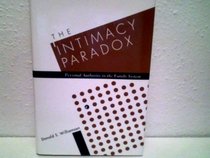Search -
The Intimacy Paradox: Personal Authority in the Family System
The Intimacy Paradox Personal Authority in the Family System
Author:
"How does one leave home emotionally and yet somehow still remain lovingly connected within the family of origin? It is my thesis that this is both the fundamental psychological issue and the essential relational challenge of adulthood....'' --From Chapter 1 — Although most people physically leave home by their early 20s, emotional separation fro... more »
Author:
"How does one leave home emotionally and yet somehow still remain lovingly connected within the family of origin? It is my thesis that this is both the fundamental psychological issue and the essential relational challenge of adulthood....'' --From Chapter 1 — Although most people physically leave home by their early 20s, emotional separation fro... more »
ISBN-13: 9780898621068
ISBN-10: 0898621062
Publication Date: 10/25/1991
Pages: 305
Rating: ?
ISBN-10: 0898621062
Publication Date: 10/25/1991
Pages: 305
Rating: ?
0 stars, based on 0 rating
Publisher: The Guilford Press
Book Type: Hardcover
Other Versions: Paperback
Members Wishing: 1
Reviews: Amazon | Write a Review
Book Type: Hardcover
Other Versions: Paperback
Members Wishing: 1
Reviews: Amazon | Write a Review
Genres:
- Health, Fitness & Dieting >> Psychology & Counseling >> Counseling >> Couples & Family Therapy
- Parenting & Relationships >> General
- Medicine >> Internal Medicine




